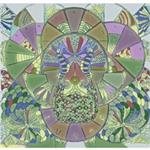|
|
 |
Dusted Reviews
Artist: Tunng Album: And Then We Saw Land Label: Thrill Jockey Review date: Apr. 5, 2010 |

|
|
|
 |
From its earliest days, the UK folktronica outfit Tunng favored a dappled interplay of light and shadow, its songs serenely folk on one level, but shot through with melancholy undercurrents and age of machinery anxieties. There was, to borrow a phrase from Mothers Daughter, a pool beneath the pond, or unacknowledged, unreachable depths just beneath the tranquility. The glimmer of modernity – in samples and quirky electronic sounds – seemed to tip the band’s bucolic utopias out of kilter. As Tunng has gone on, however, it has layered these uncertainties with an increasingly glossy veneer of pop, bringing in the celebratory energy of its live show. Good Arrows, in 2007, seemed like an almost ideal mix of Tunng’s surface joys and introspective shadings. Its highlight, “Bullets” was unstoppably hummable, but after all, about stopping firepower with one’s teeth.
Now with And Then We Saw Land, Tunng has shed one key member, Sam Genders, and turned less equivocally toward pop. The shadowiness that made Tunng so intriguing has disappeared (though you can find some of it on Genders’ new project, the Accidentals), and in its place a sort of domesticated sunshine shines through. This is not always a bad thing – “Don’t Look Down or Back” has a wonderfully buoyant chorus that is as uplifting and joyful as anything Tunng has ever done – but it is less like the old Tunng and more like the rest of the world.
With Genders gone, co-founder Mike Lindsay has turned to Becky Jacobs (trivia bonus: she’s Max Tundra’s sister) for vocals. She sings lead or prominent second on most of these tracks, in a soft, edgeless soprano that heightens the breeziness, downgrades the mysteries of Tunng’s gentle melodies.
Tunng also continues to pull back on its electronic experimentation and turn to more conventional chamber pop orchestrations. The mild techno dissonances that percolated through Mother’s Daughter had already been absorbed and integrated fully by Good Arrows, but here they have mostly evaporated. (There’s a spoken word sample in “Sashimi,” though nothing as odd as the Japanese folk song that introduced “Bullets” or the disconcerting movie-dialogue ending to “Spoons.”) Instead, we have bits of brass, strings and conventional rock-band instruments. Even “By Dusk They Were in the City,” a charming jerry-rig of alternative percussion, melodica and occasional handclaps, is bisected by a sidewinding, shred-happy guitar solo. It extends to the drumming as well, for this time, alongside Tunng’s usual rhythmic collection of sea shells, bells, chimes, blocks and musical toys, you can hear a conventional drum kit banging away in four-square beats and fills. It seems odd, especially, when you consider that Tunng has just come off a tour with Tinariwen, but they’ve become less rhythmically adventurous.
The end result is an album that would be fine as a first effort – that is, if it did not naturally have to be compared to previous Tunng albums. It is full of pretty little moments, not without its high points, possibly more accessible and potentially more popular than what the band’s done before. But it is not as oddly, transfixingly lovely as Tunng used to be, not as delicately, translucently strange. Here is a band that started way on the edge of the pack and has edged inward toward the middle, where, sadly, it’s crowded and everyone looks the same.
By Jennifer Kelly
|







